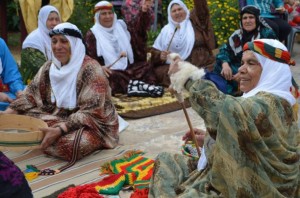By Rojava Report:
The Mothers of Peace have been organizing in Rojava since the 1990s. A couple of years ago, when the Syrian regime was still in power in the Kurdish areas, they were able to meet once or twice a year. Only after the Rojava Revolution were they able to come together regularly. The mothers – who bring their hand-made sweaters, scarves, socks and gloves along with them – distribute their work to poor families during the winter season. In a similar fashion they collect money for the poor in a common fund and distribute it the poor as well as to the ‘families of martyrs’.
Before the Rojava Revolution the Mothers of Peace were not able to come together in houses due to regime repression and so they met at suitable places outside of the city. Regime pressure prevented the establishment of organizations. They were meeting to get to know and to help one another.
Following the revolution the Mothers of Peace established an association called ‘Saziya Dayikên Aşitiyê’ (The Association of the Mothers of Peace). Although not an official organization, the mothers meet in the house of a member every month in order to organize the collective aid together with a sense of humor.
The Mothers of Peace who meet in the Hileliye neighborhood once a month are also trying to keep culture alive. Preparing bread in the traditional fashion in a tandır or on a sac, they prepare food together. While one rolls out dough, another sews clothing for the poor and the children of those killed in the Kurdish Freedom Struggle.
Mother Selima explains how every couple of months they distribute money which they collect in common for poor families and how every autumn they distribute clothing to the children of such families. Selima Mihemed, longing for the past, explains how “in old times people were more together and helped one another. Now this culture is about to disappear. But the nice side of this time is that women are now taking charge of themselves as part of the Rojava Revolution and have come to posses their own will.”
Mother Fatma is almost 90 years of age. She remembers a time before the borders. She explains that when she was a child they lived more nomadically and every summer they would head for summer pastures. Fatma, who speaks of how she helped her mother during such times, tells of how it was there that she first learned to make bread on a sac.
In days past the women came together in the home of Mother Fatma, and were again preparing on a sac for their guests. Mother Fatma prefered to explain the kind of changes which have occurred together with the women’s revolution with these examples: “Before women had no dignity. They were bought and sold. But today it is not like this, and at least there are places where women can take ownership of their own rights.”
Sighing a couple of times, Mother Fatma also speaks of how longing for the old days: “In the old days barter and exchange was one of the beauties of life. We could exchange eggs for bread, or wheat for oil. There wasn’t all this money.”
Mother Mukarima speaks of the work of Kurdish Leader Abdullah Öcalan, saying “if it wasn’t for the work of the Kurdish popular leader women would not be able to stand on their own feet today. Now our women defend themselves, form their own organizations and can stand on their own two feet. All of this was a product of the efforts and work of the Kurdish popular leader.”
.jpg)



